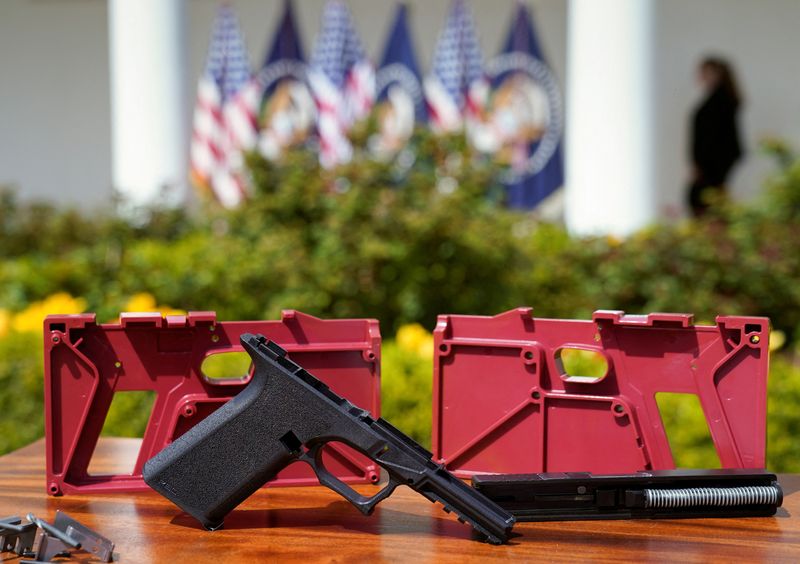By Andrew Chung
WASHINGTON (Reuters) -The U.S. Supreme Court on Monday agreed to decide the legality of a federal regulation aimed at reining in homemade "ghost guns" as President Joe Biden's administration combats the increasing use of these largely untraceable weapons in crimes nationwide.
The justices took up the administration's appeal of a lower court's decision finding that the federal Bureau of Alcohol, Tobacco, Firearms and Explosives (ATF) exceeded its authority in issuing the 2022 rule targeting parts and kits for ghost guns, which can be assembled at home in minutes.
The case will be heard during the Supreme Court's next term, which begins in October.
The ATF rule targeted the rapid proliferation of privately made ghost guns bought online without federal requirements such as serial numbers or a background check for buyers - features that make them especially attractive to criminals and others barred from lawfully purchasing firearms, including minors.
The regulation expanded the definition of a firearm under a 1968 federal law called Gun Control Act to include parts and kits that may be readily turned into a gun. It required serial numbers and mandated that manufacturers and sellers be licensed. Sellers under the rule also must run background checks on purchasers prior to a sale.
Plaintiffs including the parts manufacturers, various gun owners and two gun rights groups - the Firearms Policy Coalition and Second Amendment Foundation - sued to block the rule in federal court in Texas.
Brandon Combs, founder of the Firearms Policy Coalition, praised the court's decision to hear the case, denouncing the ATF's "unconstitutional and abusive" rule.
Eric Tirschwell, executive director of the gun safety legal group Everytown Law, urged the justices to uphold the rule "confirming that ghost guns are to be treated like the deadly firearms they are. These weapons have exacerbated our nation's gun violence epidemic."
The Justice Department did not immediately respond to a request for comment.
HARD TO TRACE
According to the administration, police departments nationwide have confronted "an explosion of crimes involving ghost guns," now recovering tens of thousands of the weapons every year.
Yet ghost guns are almost impossible to trace. The ATF successfully traced to unlicensed purchasers less than 1% of unserialized firearms recovered from crime scenes between 2016 and 2021, court papers showed.
The rule imposes on the sale of parts and kits the same conditions that already govern firearms manufacturers and dealers in millions of other transactions every year, according to the administration.
Even though the New Orleans-based 5th U.S. Circuit Court of Appeals in November sided with the plaintiffs, it remains in effect due to actions taken by the Supreme Court.
The justices twice last year acted against orders issued by Fort Worth, Texas-based U.S. District Judge Reed O'Connor in favor of the plaintiffs. In August, they halted his ruling to block the regulation pending further litigation. In October, they set aside his injunction that would have let two manufacturers continue selling their ghost gun products.
O'Connor issued a 2023 ruling invalidating the rule, finding that the administration exceeded its authority under the Gun Control Act. The congressional definition of a firearm "does not cover weapon parts, or aggregations of weapon parts, regardless of whether the parts may be readily assembled into something that may fire a projectile," the judge concluded.
The 5th Circuit upheld O'Connor's decision faulting the ATF, saying the agency impermissibly rewrote the firearms law while attempting to "take on the mantle of Congress to 'do something' with respect to gun control. But it is not the province of an executive agency to write laws for our nation."
The plaintiffs have portrayed the policy as a threat to the long history of legal private gunsmithing in the United States. Unlike some other gun-related cases, this one goes not center on the U.S. Constitution's Second Amendment right to "keep and bear arms."
The United States, with the world's highest gun ownership rate, remains a nation deeply divided over how to address firearms violence including frequent mass shootings.

In three major rulings since 2008, the Supreme Court has widened gun rights, including a 2022 decision that declared for the first time that the U.S. Constitution protects an individual's right to carry a handgun in public for self-defense.
In another gun-related case, the court on Feb. 28 heard arguments over the legality of a federal ban on "bump stocks" - devices that enable semiautomatic weapons to fire rapidly like machine guns. A ruling in that case is expected by the end of June.